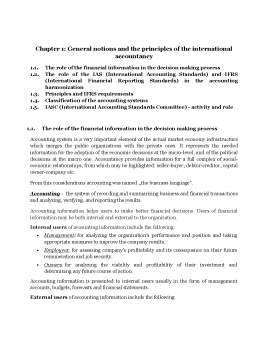Extras din curs
Chapter 1: General notions and the principles of the international accountancy
1.1. The role of the financial information in the decision making process
1.2. The role of the IAS (International Accounting Standards) and IFRS (International Financial Reporting Standards) in the accounting harmonization
1.3. Principles and IFRS requirements
1.4. Classification of the accounting systems
1.5. IASC (International Accounting Standards Committee) - activity and role
1.1. The role of the financial information in the decision making process
Accounting system is a very important element of the actual market economy infrastructure which merges the public organizations with the private ones. It represents the needed information for the adoption of the economic decisions at the micro-level, and of the political decisions at the macro one. Accountancy provides information for a full complex of social-economic relationships, from which may be highlighted: seller-buyer, debtor-creditor, capital owner-company etc.
From this considerations accounting was named ,,the business language”.
Accounting - the system of recording and summarizing business and financial transactions and analyzing, verifying, and reporting the results.
Accounting information helps users to make better financial decisions. Users of financial information may be both internal and external to the organization.
Internal users of accounting information include the following:
-Management: for analyzing the organization's performance and position and taking appropriate measures to improve the company results.
-Employees: for assessing company's profitability and its consequence on their future remuneration and job security.
-Owners: for analyzing the viability and profitability of their investment and determining any future course of action.
Accounting information is presented to internal users usually in the form of management accounts, budgets, forecasts and financial statements.
External users of accounting information include the following:
-Creditor: for determining the credit worthiness of the organization. Terms of credit are set according to the assessment of their customers' financial health. Creditors include suppliers as well as lenders of finance such as banks.
-Tax Authorities: for determining the credibility of the tax returns filed on behalf of the company.
-Investors: for analyzing the feasibility of investing in the company. Investors want to make sure they can earn a reasonable return on their investment before they commit any financial resources to the company.
-Customers: for assessing the financial position of its supplier which is necessary for a stable source of supply in the long term.
-Regulatory Authorities: for ensuring that the company's disclosure of accounting information is in accordance with the rules and regulations set in order to protect the interests of the stakeholders who rely on such information in forming their decisions.
External users are communicated accounting information usually in the form of financial statements.
Accounting is a vast and dynamic profession and is constantly adapting itself to the specific and varying needs of its users. Over the past few decades, accountancy has branched out into specialized areas to cater for the different needs of the users.
In order, for financial information to be understood by all the users, including those from other countries, it is necessary to obtain this information by respecting the unique accounting laws. This explains the necessity of applying IFRS.
1.2. The role of the IAS (International Accounting Standards) and IFRS (International Financial Reporting Standards) in the accounting harmonization
The international harmonization process of Accounting Standards started somewhere in the 1960s’ and recent developments show that it is still going on. For us it seems interesting to
reflect on this process and to ask about the characteristics (driving forces, actors, stages) of it.
Harmonization is the attempt to bring together different systems.
International accounting harmonization can be defined as “the process of bringing international Accounting Standards into some sort of agreement so that the financial statements from different countries are prepared according to a common set of principles of
measurement and disclosure” .
As alternative to harmonization three other ways can be thought of, in order to make financial statements comparable:
Mutual recognition - means that national financial statements are accepted abroad, although
they are not prepared in accordance with Accounting principles of the foreign country .
The possibility of mutual recognition exists already in some countries like, for example, between the United States and Canada. This means for American companies that their financial statements based on US-Generally Accepted Accounting Principles will be accepted through the Canadian stock exchange regulators. Furthermore, mutual recognition is as well
possible between European countries. The disadvantage of mutual recognition is that the user of financial statements has to be familiar with two different sets of standards. Further the questions, which result is right and which system is better?
Preview document
Conținut arhivă zip
- International Accountancy
- 2.2 intangible and tangible assets.docx
- Chapter 1.docx
- Chapter 2.docx





































